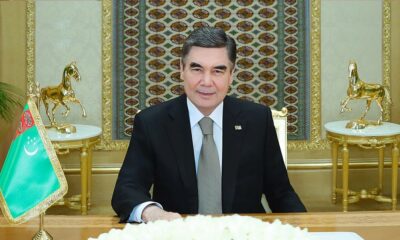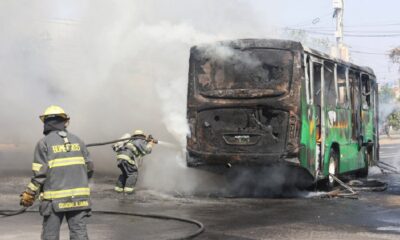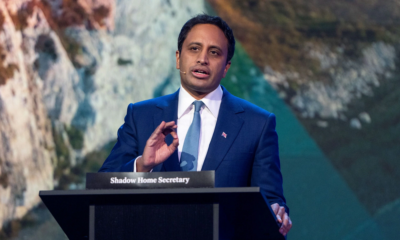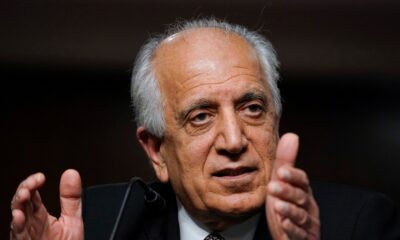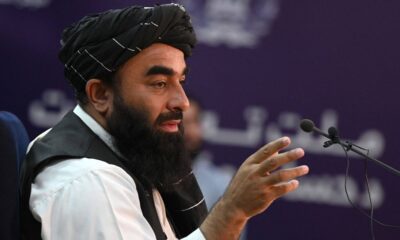World
Wildfires blaze through Algeria, killing 65

Wildfires tearing through forested areas of northern Algeria have killed at least 65 people, state television reported on Wednesday (August 11) as the country battled some of the most destructive blazes in its history.
The government has deployed the army to help fight the fires, which have burnt most fiercely in the mountainous Kabylie region, and 28 of the dead are soldiers.
Eyewitness footage showed fires ripping through a forest in Tizi Ouzou, the largest Kabylie district, where houses have burned and residents have fled to hotels, hostels and university accommodation in nearby towns.
President Abdelmadjid Tebboune declared three days of national mourning and froze state activities not related to the fires.
French President Emmanuel Macron said Paris would send two water bombers to the Kabylie region, promising on Twitter to “bring all our support to Algerian citizens.”
Forest fires have set large parts of Algeria, Turkey and Greece aflame over the past week as temperatures rose.
Dozens of fires have raged through forest areas across northern Algeria since Monday (August 9). On Tuesday (August 10), Interior Minister Kamel Beldjoud accused arsonists of igniting the flames, but produced no evidence.
Meanwhile, Algeria has arrested 22 people suspected of being behind the most devastating wildfires in the country’s history that killed 65 people, President Abdelmadjid Tebboune said on Thursday, calling the fires a ‘disaster’ and urging the preservation of national unity.
Dozens of forest fires have hit mountainous areas in northern Algeria since Monday, mainly in Tizi Ouzou, the main province of the Kabylie region east of the capital, Algiers.
“Some fires have been caused by high temperatures but criminal hands were behind most of them,” Tebboune said in a live speech on state television. “We have arrested 22 suspects, including 11 in Tizi Ouzou. Justice will perform its duty.”
World
Mexican military kills cartel boss ‘El Mencho’ in US-backed raid

One of Mexico’s most notorious drug lords, Nemesio Oseguera, or “El Mencho,” was killed in a military raid on Sunday, sparking widespread retaliatory violence.
President Claudia Sheinbaum has been under mounting pressure from Washington to intensify her offensive against drug cartels blamed for producing and smuggling drugs, particularly the synthetic opioid fentanyl, across the border to the U.S., Reuters reported.
Oseguera, 60, the mastermind of the powerful Jalisco New Generation Cartel (CJNG) died in custody after being injured in a military operation by Mexican special forces in the town of Tapalpa on Mexico’s Pacific coast in Jalisco state, according to Mexico’s defense ministry.
His corpse arrived in Mexico City on Sunday afternoon in a heavily guarded convoy of National Guard troops.
Reuters had reported on Sunday that a new U.S.-military-led task force played a role in the raid led and carried out by Mexican forces. White House press secretary Karoline Leavitt later posted on social media that the United States provided intelligence support.
Leavitt added that the Trump administration “commends and thanks the Mexican military for their cooperation and successful execution of this operation.”
After reports of El Mencho’s death, cartel henchmen blockaded highways with burning cars and torched businesses in more than a half a dozen states, paralyzing parts of the country. No civilian deaths have been reported.
In Jalisco’s popular beach resort of Puerto Vallarta, frightened tourists on social media described a “war zone” as plumes of dark smoke rose into the sky from around the bay. Air Canada (AC.TO), United Airlines, Aeromexico and American Airlines suspended flights in the area.
FORMER COP TO CARTEL KINGPIN
Oseguera, a former police officer, founded and oversaw the rapid rise of the CJNG, named for the western state of Jalisco that is home to one of Mexico’s biggest cities, Guadalajara.
In recent years, CJNG has expanded into one of Mexico’s most powerful cartels, known for violent tactics including forced labor and forced recruitment.
Under El Mencho’s leadership, CJNG also became a highly diversified criminal enterprise, expanding from drug trafficking to fuel theft, extortion, human smuggling, and complex financial frauds. The cartel pioneered use of drones in attacks against civilians in remote regions of western Mexico as part of its rapid territorial expansion.
Sunday’s raid was one of Mexico’s highest profile blows against drug gangs responsible for smuggling billions of dollars of drugs – including fentanyl – into the U.S. In recent years, the leaders of the rival Sinaloa Cartel – Joaquin ‘El Chapo’ Guzman and Ismael “El Mayo” Zambada- were captured alive. Both are now in U.S. prisons.
President Donald Trump’s administration lauded El Mencho’s killing, but domestic violence it triggered highlighted the political balancing act Sheinbaum must strike as her government escalates its cartel offensive.
On Sunday, Sheinbaum stressed that activities in most areas of the country were proceeding as usual. Schools in various states across Mexico protectively canceled classes for Monday, according to announcements by state-level education departments.
Security experts were watching whether the raid and death of the cartel boss will fracture CJNG leadership and trigger bloody infighting.
“There will definitely be skirmishes between the various factions, and these spasms of violence could last for years,” said Carlos Olivo, a former U.S. Drug Enforcement Administration assistant special agent in charge and an expert in CJNG.
KILLING WINS US PRAISE
U.S. Deputy Secretary of State Christopher Landau, previously ambassador to Mexico, said Oseguera’s killing was a “great development” for the U.S. and Mexico, as well as the rest of Latin America.
In January after the U.S. capture of Venezuelan President Nicolas Maduro, Trump said “the cartels are running Mexico,” and warned “we are going to start now hitting land with regard to the cartels.”
Sheinbaum said she would strengthen efforts to cooperate with the U.S. to fight cartels., but vowed to uphold Mexico’s sovereignty and warned against any unilateral military action by the U.S. in Mexico.
Sheinbaum in a social media post on Sunday said security officials would provide information on the operation.
World
Trump furious after Supreme Court upends his global tariffs, imposes new 10% levy

U.S. President Donald Trump responded with fury to Friday’s Supreme Court ruling that he lacked the power to unilaterally set tariffs on imports, denouncing individual justices as he vowed to continue a global trade war that has kept the world on edge for a year.
Saying he was undeterred by what he repeatedly called a ridiculous ruling, Trump announced an immediate new 10% tariff on imports from all countries, on top of any existing tariffs, and then issued a proclamation putting them into effect. The law allows him to impose a levy of up to 15% for 150 days, although it could face legal challenges, Reuters reported.
The court’s landmark 6-3 ruling upended the leverage Trump and his trade envoys have wielded over foreign governments at negotiating tables to reshape diplomatic relations and global markets.
The ruling briefly sent U.S. stock indexes surging, before ending modestly higher as analysts warned of renewed confusion in global markets while they await Trump’s next moves.
Hours after the ruling, Trump signed an executive order repealing the tariffs that the court struck down, and he also issued a proclamation imposing a 10% duty on most goods imported into the U.S. for 150 days, granting exemptions for certain items including critical minerals, metals and energy products, the White House said.
TRADE DEALS, REVENUE IN QUESTION
The ruling called into question the trade deals Trump’s envoys have negotiated in recent months under the threat of high tariffs. It left open the fate of the $175 billion Trump has collected from U.S. importers under what the court said was his incorrect reading of the law.
“I’m ashamed of certain members of the court, absolutely ashamed, for not having the courage to do what’s right for our country,” Trump told reporters at the White House, complaining that foreign countries were ecstatic and “dancing in the street.”
He insinuated, without evidence, that the majority of the court caved to foreign influence: “They’re very unpatriotic and disloyal to our Constitution. It’s my opinion that the court has been swayed by foreign interests and a political movement that is far smaller than people would ever think.”
Since returning to the White House 13 months ago, Trump has said he had what the court summarized as the “extraordinary power to unilaterally impose tariffs of unlimited amount, duration, and scope.” Citing a national emergency, he said the International Emergency Economic Powers Act (IEEPA) meant he could set tariffs at any rate he chose.
The court grounded its opinion, which was written by Chief Justice John Roberts, with a quote from the U.S. Constitution: “The Congress shall have Power To lay and collect Taxes, Duties, Imposts and Excises.”
The argument by the Trump administration that it had identified a war-like emergency to justify a loophole failed to persuade the court.
“The Government thus concedes, as it must, that the President enjoys no inherent authority to impose tariffs during peacetime,” Roberts wrote.
“And it does not defend the challenged tariffs as an exercise of the President’s warmaking powers. The United States, after all, is not at war with every nation in the world.”
Despite the court’s bluntness in ruling the president had exceeded his authority, Trump told reporters: “It’s ridiculous, but it’s OK, because we have other ways, numerous other ways.”
ECONOMIC UNCERTAINTY RISES
After a year of Trump’s often ad hoc tariff announcements whipsawing markets and the global economy, the ruling and Trump’s response reintroduced a hefty dose of uncertainty that economists, investors and policymakers had hoped was in the rearview mirror.
“I think it will just bring in a new period of high uncertainty in world trade, as everybody tries to figure out what the U.S. tariff policy will be going forward,” said Varg Folkman, analyst at the European Policy Centre think tank.
U.S. Treasury Secretary Scott Bessent said the court ruling could have mixed results.
“The Supreme Court has taken away the President’s leverage, but in a way, they have made the leverage that he has more draconian because they agreed he does have the right to a full embargo,” Bessent told “The Will Cain Show” on Fox News.
“We will get back to the same tariff level for the countries. It will just be in a less direct and slightly more convoluted manner,” he said.
In announcing his new temporary 10% tariff, Trump became the first president to invoke Section 122 of the Trade Act of 1974, which allows the president to levy tariffs of up to 15% for up to 150 days to fix “fundamental international payments problems.” That, too, could draw legal challenges. Such tariffs can only be extended with Congress’ authorization.
World
Trump warns Iran of ‘bad things’ if no deal made, sets deadline of 10-15 days

President Donald Trump warned Iran on Thursday it must make a deal over its nuclear program or “really bad things” will happen, and set a deadline of 10 to 15 days, drawing a threat from Tehran to retaliate against U.S. bases in the region if attacked.
Amid a massive U.S. military buildup in the Middle East that has fueled fears of a wider war, Trump said negotiations with Iran to end the tense standoff were going well but demanded that Tehran reach a “meaningful” agreement, Reuters reported.
“Otherwise bad things happen,” Trump, who has repeatedly threatened to attack Iran, told the first meeting of his Board of Peace in Washington.
Trump spoke of the U.S. airstrikes carried out in June, saying Iran’s nuclear potential had been “decimated,” adding “we may have to take it a step further or we may not.”
“You’ll be finding out over the next probably 10 days,” he said. Asked later to elaborate, he told reporters aboard Air Force One: “I would think that would be enough time, 10, 15 days, pretty much maximum.”
But he declined to be specific, except to warn again of “really bad things” and insist that Iran would have to make a deal one way or another.
In a letter to U.N. Secretary-General Antonio Guterres, Tehran said it would not start any war but that “in the event that it is subjected to military aggression, Iran will respond decisively and proportionately” in its exercise of the right of self-defense.
“All bases, facilities, and assets of the hostile force in the region would constitute legitimate targets,” the letter said. “The United States would bear full and direct responsibility for any unpredictable and uncontrolled consequences.”
‘GOOD TALKS’: TRUMP
Trump’s threats to bomb Iran, with the two sides far apart in talks on Tehran’s nuclear program, have pushed up oil prices, and a Russian corvette warship on Thursday joined planned Iranian naval drills in the Gulf of Oman, a vital sea route for global energy.
Iranian and U.S. negotiators met on Tuesday and Iranian Foreign Minister Abbas Araqchi said they had agreed on “guiding principles.” White House press secretary Karoline Leavitt said on Wednesday, however, that the two sides remained apart on some issues.
Trump said “good talks are being had,” and a senior U.S. official said Iran would make a written proposal on how to address U.S. concerns.
Trump called on Tehran to join the U.S. on the “path to peace.”
“They can’t have a nuclear weapon, it’s very simple,” he said. “You can’t have peace in the Middle East if they have a nuclear weapon.”
Iran has resisted making major concessions on its nuclear program, though insisting it is for peaceful purposes. The U.S. and Israel in the past have accused Tehran of trying to develop a nuclear bomb.
Trump’s latest saber-rattling came as he talked himself up as a man of peace in a long, meandering speech while hosting world leaders at the launch of his Board of Peace. He proposed the body in September when he announced his plan to end Israel’s war against Hamas in Gaza. He later expanded the board’s remit to tackle conflicts worldwide, prompting many key Western allies to stay away.
Earlier on Thursday, Russia warned against an “unprecedented escalation of tension” around Iran on Thursday and urged restraint amid the U.S. military buildup in the region, which a senior American official said should be complete by mid-March.
THREAT OF WAR
Trump has sent aircraft carriers, warships and jets to the region, raising the prospect of another attack on the Islamic Republic.
The United States and Israel bombed Iran’s nuclear facilities and some military sites last June. U.S. Secretary of State Marco Rubio will meet Israeli Prime Minister Benjamin Netanyahu to discuss Iran on February 28, the senior U.S. official said.
Washington wants Iran to entirely give up uranium enrichment, a process used to create fuel for atomic power plants but that can also provide material for a warhead.
The U.S. and ally Israel also want Iran to give up long-range ballistic missiles, stop supporting groups around the Middle East and stop using force to quell internal protests.
Iran says it refuses to discuss issues beyond the atomic file, calling efforts to limit its missile arsenal a red line.
Satellite pictures have tracked both Iranian work to repair and fortify sites since last summer, showing work at both nuclear and missile sites, as well as preparations at U.S. bases across the Middle East over the past month.
Iran’s joint exercise with Russia came days into an extended series of Iranian naval drills in the Gulf of Oman, with Iranian state television showing special forces units deployed on helicopters and ships.
In a sign of growing concern over the increased tensions, Poland on Thursday became the latest European country to urge its citizens to leave Iran, with Prime Minister Donald Tusk saying Poles may only have hours to evacuate.
Trump began threatening strikes on Iran again in January as Iranian authorities crushed widespread protests with deadly violence that left thousands dead across the country.
-
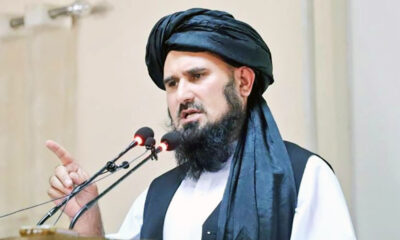
 Latest News5 days ago
Latest News5 days agoAfghanistan’s Chief of Armed Forces underscores readiness and equipment for national defense
-
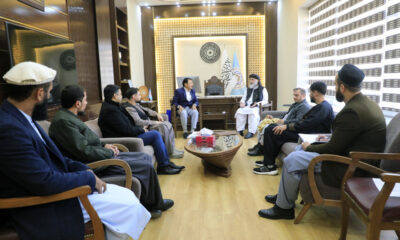
 Latest News4 days ago
Latest News4 days agoAfghanistan welcomes investment and technology partnerships with India
-

 Sport4 days ago
Sport4 days agoAfghan Peaks founder climbs Aconcagua to promote Afghanistan’s mountain potential
-

 Latest News3 days ago
Latest News3 days agoIndian customs seize Chinese walnuts falsely declared as Afghan
-

 Business4 days ago
Business4 days agoPakistan allows re-export of stranded Afghan transit cargo
-
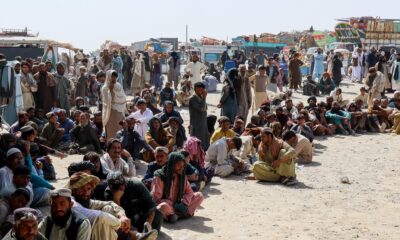
 Latest News3 days ago
Latest News3 days agoPakistan’s Punjab to send home 20 more Afghans in repatriation drive
-

 Latest News4 days ago
Latest News4 days agoPakistan signals possible air strikes as Kabul releases Pakistani soldiers in goodwill move
-

 Latest News5 days ago
Latest News5 days agoAfghanistan welcomes Ramazan; authorities emphasize security and support for citizens


